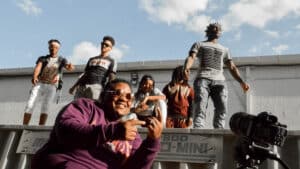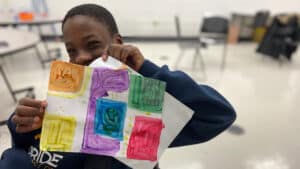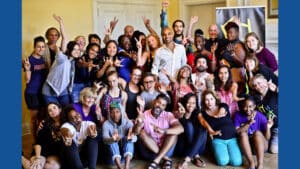STORY #16: Putting Mental Health First
OCU distinguishes itself from other mental health service organizations because we practice a unique approach to breaking cycles of violence. By integrating art and music as a healthy outlet/coping mechanism to achieve a peaceful resolution. My role as a mental health professional with One Common Unity entails providing mental health services to students, staff, and administration in the D.C. Public School System (DCPS). OCU’s commitment to spreading peace within the mental health community is something special. The Fly by Light program in itself is something remarkable due to its strong emphasis on spreading peace via art and music. Integration within the DCPS system and the supportive role we play for their counseling teams, staff, teachers, and administrators are critically important.
Our OCU School-Based Mental Health team is diverse, bringing together different perspectives and training necessary to work together as efficiently as possible. Our camaraderie is not only collaborative, but we’re accustomed to brainstorming and sharing various interventions and strategies with each other. Within our team meetings, clinicians have the opportunity to share what’s working and any challenges they’re encountering to receive constructive feedback from the rest of the members of our team. We also meet Friday afternoons (informally) to reconnect by socializing, playing games, and engaging in a way that focuses on relationship-building and connection.
The pandemic certainly changed our dynamic because it created substantial barriers to connect with students. OCU Clinicians are embedded members of the schools where they work. Without actually being on-site, it is challenging to ensure students attend their scheduled appointments—we can’t just track down our students in the halls like before. It also became unclear whether they can attend their appointments because they are overwhelmed, experiencing technological problems, or having other issues. It’s incredibly complicated for clinicians assigned to high schools because these students are the most difficult to interact with, especially virtually. Moreover, having to use technology has been more difficult online than in previous times. It’s unclear if this is due to unfamiliarity and/or discomfort with the technology when bandwidth for families is more compromised than usual or due to the ongoing challenges presented by the pandemic.
OCU has recently launched a behavioral health clinic (Outpatient Services) as an option to fill that vital role which allowed us to pivot during the uncertainty and instability that stemmed from the onset of the pandemic. It has always been a challenge for clinicians to see clients regularly due to circumstances beyond their control (e.g., no shows, failure to complete consent forms), so you can probably imagine how COVID exacerbated these problems. Outpatient services allowed us to continue contributing to the community by meeting with clients who were still seeking our care. The D.C. community benefits from Outpatient Services because it will enable us to provide mental health services to a broader range of community members.
Mental health services have always been critical to D.C., the nation, and even the world as a whole. The need for mental health services across the globe (including D.C.) has only increased! And those services are especially critical now as we’re navigating civil unrest, police brutality, rampant mis/disinformation, voter disenfranchisement, and other pressing socio-economic challenges that have escalated the precarious living conditions of the predominantly lower-income families we serve.
At the same time, mental health professionals need to prioritize their own mental wellness. If you aren’t prioritizing your own mental health, you’re less able to help those in crisis around you. And, unfortunately, most (if not all of us) are operating under less than ideal conditions for ourselves and our families amidst this tumultuous time.

Mental Health Awareness Month is about normalizing the need for & the benefits of robust, easily accessible mental health services. Given the ongoing issues related to today’s political climate, the importance of integrating trained mental health professionals as part of the solution to helping individuals in crisis should be a critical part of our country’s conversations, whether they take place within communities or at our schools.
— Chris

Christopher Reeves, a Licensed Clinical Social Worker with One Common Unity, is passionate about helping people find balance in their lives through wellness and mindfulness. He believes musical and artistic expression can be powerful tools to navigate challenges and adversity.






